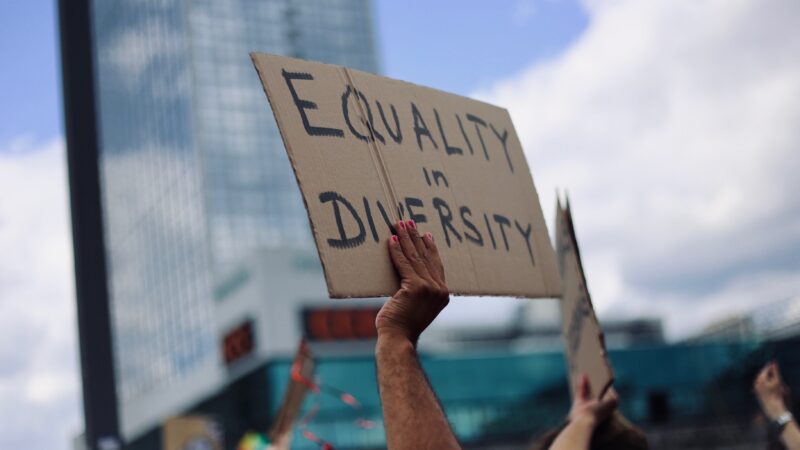Over the past few decades, the media has been obsessed with characters representing minorities in society who haven’t received much recognition on television before. The hope is that a person of colour might see a black Hermione or a girl might see a female Doctor Who and think “that could be me!” and feel represented in British Society.
Like most of British society, I hold the view that unless a character’s race is an important part of their role, we should give actors parts based on their skill and performance. I also believe that casting directors should be able to have the freedom to cast whoever they want in their movies. After all, if they make the wrong decision they will pay the price. For example, the Ghostbuster reboot which had an all-female main cast was widely reported to be a flop, warning future filmmakers of the consequences of casting on diversity for diversity’s sake.
The original argument was for minorities to be proportionately represented on television as they are in British society. However, same sex attracted people and ethnic minorities are now over represented on screen. BAME people account for 13% of the national workforce but 23% of on screen roles. Lesbian, gay and bisexual people are nearly twice as likely to appear on television.
In addition, the presence of LGBT and ethnic minorities on television is often dedicated to side characters. On some occasions, the producers try to lump as many diversity points onto one character while still having a white straight protagonist. For example in the series Sex Education, the three main people of colour are Eric, Ola and Jackson. Two of these characters have had same sex relationships and the other has two mums and attempts to get into a relationship with a “non-binary” Sudanese-American character introduced in the last season. Meanwhile, the two main characters, Otis and Maeve, are both white and straight. This identity points dumping ruined the character of Jackson, who is already dealing with the conflict of being a high achiever who can’t meet the expectations that he and his mums have for him. Instead of trying to figure out who he is, his main issue this season is getting with a rebellious “non-binary” girl who is annoyed at him for seeing her “as a girl” instead of “non-binary”.
This isn’t to say that there can’t be shows and movies which have BAME and LGBT people as the majority of the cast. It’s not unrealistic for a show about people in London for example to have an ethnic minority cast. For example, the show Chewing Gum, featuring a black main cast, was extremely funny and well produced. The show was created by Michaela Coel who grew up in East London so the reason behind the diversity casting is because of her own experience and background, rather than some white middle class liberal who wants to gain diversity points. This contrasts to the announcement of there being a production of Anne Boleyn on which the actress who plays Anne Boleyn is black. The show’s creators admitted to adopting a “race conscious” approach, rather than picking who could play a realistic Anne Boleyn or even a colour-blind casting of who is best for the role.
However, it seems that identity and virtue signalling is everything nowadays. The left even are trying to make horror villains gay icons. Vox published an article on “How the Babadook became the LGBTQ icon we didn’t know we needed”. In addition, even Chucky has shown his respect for the LGBT community as he accepts his “gender fluid” child, stating “I’m not a monster”. It’s odd that the LGBT community are so keen to relate themselves to monsters who are hostile towards children. Surely these aren’t characters you want to represent you?
Most recently, Doctor Who has fallen victim to diversity casting. Recently, Sex Education’s Ncuti Gatwa has been casted as the next Doctor, taking the place of Jodie Whittaker. In addition, a new character called Rose will be played by a biological man who calls himself a transgender woman. Many have scoffed at those who have had complaints about the Doctor and his companion changing identity. For example, The Guardian wrote:
“There is no way on earth that a shapeshifting ancient alien god and an interdimensional explorer trapped in a parallel dimension should be played by anything other than a white British guy and the woman from I Hate Suzie respectively.”
However, this shifts from the original idea that minorities need to be represented for people to see themselves in the characters. Modern media holds the conflicting ideas that identity is everything and to act ‘colour blind’ is racist and that a character can be any colour. Not only is it important that we display the voices and experiences of minorities, but it doesn’t matter if we replace traditionally played white characters with ethnic minorities.
Personally, I don’t need to share the same identity as a character in order to relate to them.When I was younger I used to dress up as Harry Potter and got offended when I went to The Making of Harry Potter and somebody thought I was dressed up as Hermione. That is because I identified with the character of Harry Potter. It didn’t matter that he was a boy as I aspired to be as brave as him when I was young.
Though I’m doubtful, I hope that the media sees the error of its ways and focuses on providing thought provoking entertainment that doesn’t rely on progressive pandering. Being purely identity-focused on unchangeable characteristics such as race, gender and sexuality is creating a generation full of narcissists. A movie shouldn’t be good because it has people who look like you; it should be good because of the message it sends.



